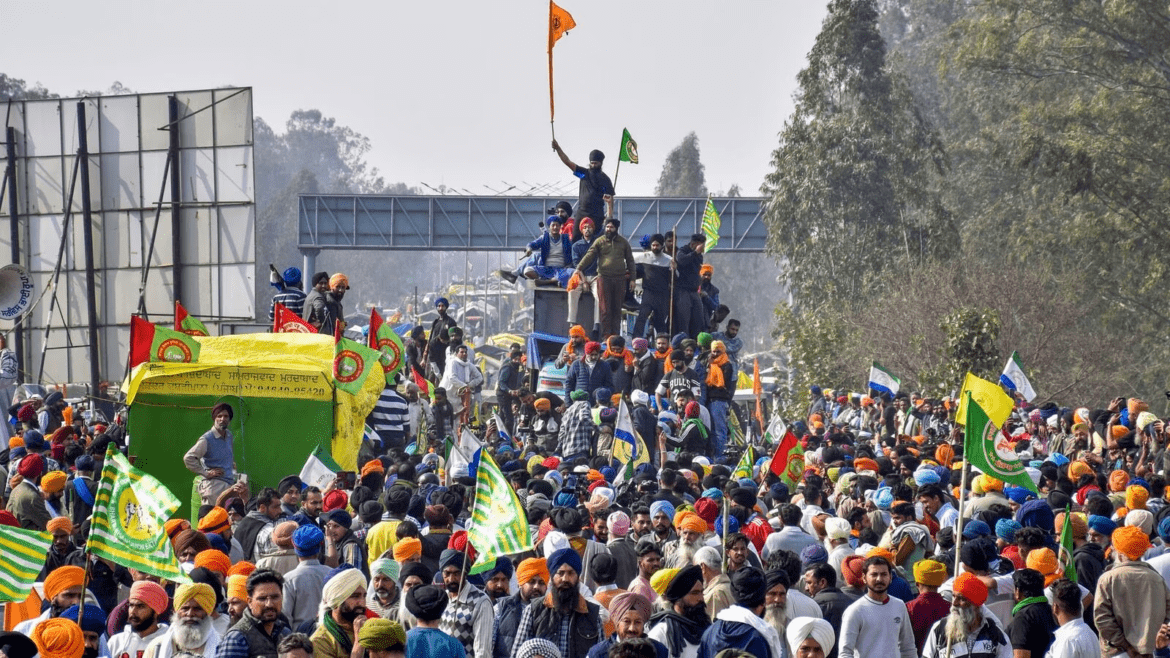AI Generated Summary
- The farmers’ discontent signals a deeper malaise within the Indian polity and economy, one that requires not just policy solutions but a fundamental rethinking of the relationship between the state, the market, and the agricultural sector.
- Despite the government’s efforts to incrementally increase the Minimum Support Price (MSP) for 22 crops, the farming community’s wish list stretches far beyond, encompassing a complete debt waiver, a monthly pension for senior farmers, and a nostalgic return to the Land Acquisition Act of 2013.
- The fourth round of negotiations between the Central government and farmers’ unions in Chandigarh marks yet another attempt to bridge the vast chasm between the farmers’ lofty demands and the government’s policy proposals.
In a bold revival of dissent, Indian farmers are orchestrating a fresh chapter of protest, dubbed ‘Delhi Chalo 2.0’. With aspirations towering as high as the stars, their demands from the government are both vast and, to many, seemingly unrealistic. Despite the government’s efforts to incrementally increase the Minimum Support Price (MSP) for 22 crops, the farming community’s wish list stretches far beyond, encompassing a complete debt waiver, a monthly pension for senior farmers, and a nostalgic return to the Land Acquisition Act of 2013.
The audacity of their demands doesn’t end there. The farmers propose a radical overhaul of India’s trade policies, including the termination of all current free trade agreements and a departure from the World Trade Organisation (WTO). This stance not only challenges the fabric of global economic cooperation but also questions the viability of such isolationist measures.
This unfolding saga, humorously yet critically dubbed “Farmers Protest 2.0: Demanding the Unattainable”, mirrors a perplexing narrative where logic and economic pragmatism seem to be in short supply. The fourth round of negotiations between the Central government and farmers’ unions in Chandigarh marks yet another attempt to bridge the vast chasm between the farmers’ lofty demands and the government’s policy proposals.
On the negotiation table, the government has laid out proposals aimed at injecting stability into the agricultural sector. These include a five-year plan for the procurement of specific crops at MSP and structured agricultural contracts to ensure predictable incomes for farmers. Such measures reflect a concerted effort to bring a semblance of order to the unpredictable nature of farming incomes.
However, the backdrop to these protests is a complex web of political maneuvering and economic disparities. The timing and the nature of the demands raise questions about the protests’ underlying motives, especially with the looming Lok Sabha elections. The significant participation of farmers from politically pivotal states like Punjab, Haryana, and Uttar Pradesh suggests a strategic play in the grand chessboard of Indian politics.
Amidst this political theatre, the economic realities faced by farmers across India cannot be overstated. The stark contrast in income between farmers in Punjab and those in other states highlights a broader issue of economic inequality within the agricultural sector. Punjab’s farmers enjoy a disproportionately high MSP and government support, a privilege not extended to all. This disparity sheds light on the nuanced challenges of India’s agricultural policy and the need for a more equitable approach.
Critics argue that the blanket implementation of MSP for all crops is both impractical and economically unsustainable. Agricultural economist Dr. Ashok Gulati points to the success of sectors like poultry, fisheries, and milk, which thrive without MSP, suggesting that alternatives such as crop insurance and a price stabilization fund could offer more viable solutions to market crises.
Moreover, the environmental and health implications of excessive pesticide use in Punjab, epitomized by the harrowing image of the ‘cancer train’, underscore the urgent need for agricultural diversification and sustainable practices.
As this chapter of protest unfolds, it becomes increasingly clear that the issues at stake transcend mere agricultural policy. The farmers’ discontent signals a deeper malaise within the Indian polity and economy, one that requires not just policy solutions but a fundamental rethinking of the relationship between the state, the market, and the agricultural sector. The path forward is fraught with challenges, but it also offers an opportunity for meaningful reform and dialogue. The question remains: will the farmer leaders seize this opportunity, or will they remain entrenched in their respective positions, leaving the farmers’ genuine grievances unaddressed? Only time will tell, but the stakes have never been higher.
The opinions expressed in this article are those of the author. They do not purport to reflect the opinions or views of Khalsa Vox or its members.




